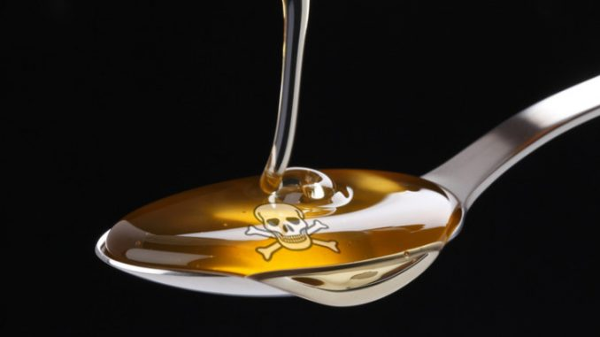
YourNewsWire.com reported
that food producers have renamed high-fructose corn syrup (HFCS) in order to
deceive the public into thinking their products no longer contain the harmful
compound.
The article makes an example of Vanilla Chex cereal by General Mills:
According to the Corn Refiners Association (CRA), there's been
a sneaky name change. The term 'fructose' is now being used to denote a product
that was previously known as HFCS-90, meaning it is 90 percent pure fructose.
Compare this to what is termed 'regular' HFCS, which contains either 42 or 55
percent fructose, and you will know why General Mills is so eager to keep you
in the dark.
CRA explains:
"... HFCS-90 is sometimes used in natural and 'light' foods, where very little
is needed to provide sweetness. Syrups with 90% fructose will not state high
fructose corn syrup on the label [anymore], they will state 'fructose' or
'fructose syrup'."
Read the full article here.
(Image credit: yournewswire.com)
What's the Big Deal?
Reading the article, it sounds like renaming HFCS-90 to "fructose" shouldn't
deserve the shade yournewswire.com gives it. I mean, if it's 90% fructose,
why not just call it "fructose?"
Here's why: natural sugar and "fructose" aren't the same thing. Actual
fructose is a component of sugar; sucrose molecules are broken down by digestion
to be useful to the body. The fructose contained in HFCS is not digested, as
Dr. Mark Hyman explains in his article,
"5 Reasons Why High Fructose
Corn Syrup Will Kill You" (emphasis mine):
High fructose corn syrup is an industrial food product and far from "natural"
or a naturally occurring substance. It is extracted from corn stalks ...
resulting in a chemically and biologically novel compound
called HFCS. Some basic biochemistry will help you understand this.
Regular cane sugar (sucrose) is made of two-sugar molecules bound tightly together–
glucose and fructose in equal amounts. The enzymes in your digestive tract must
break down the sucrose into glucose and fructose, which are then absorbed into
the body. HFCS also consists of glucose and fructose, not in a 50-50 ratio, but
a 55-45 fructose to glucose ratio in an unbound form.... Since there is there is no
chemical bond between them, no digestion is required so they are more rapidly
absorbed into your blood stream. Fructose goes right to the liver and triggers
lipogenesis (the production of fats like triglycerides and cholesterol)
[. This] is why it is the major cause of liver damage
in this country and causes a condition called "fatty liver"
which affects 70 million people. The rapidly absorbed glucose triggers
big spikes in insulin – our body’s major fat storage hormone.
Both these features of HFCS lead to increased metabolic disturbances that drive
increases in appetite, weight gain, diabetes, heart disease, cancer, dementia,
and more.
So the big deal is, products are being packaged stating they're free of
HFCS, when in fact they still contain the engineered, unbound form of fructose.
Even worse, HFCS-90 is 90% unbound fructose, not the 42% or 55% fructose in
standard HFCS — basically, twice the concentration of unbound fructose
of the other two varieties (albeit used in lesser quantity, according to
the CRA source of the yournewswire.com article).
|